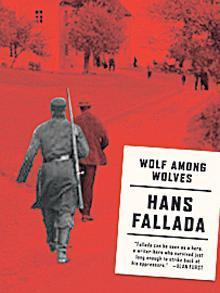My review of Hans Fallada's Wolf Among Wolves

Germany 1923: with exponential inflation, ever-rising poverty in the cities, and the French occupation and bleeding dry of the Ruhr in the background, Fallada follows the fortunes of three ex-soldiers who had fought together in WWI but who now, like most of their countrymen, are struggling to make sense of the present state of chaos.
The soldiers move from hunger-, drink-, cocaine-, prostitution- and gambling-stricken Berlin to what they imagine will be a better life in the countryside, however their hopes are disappointed: around them, a downward spiral of recklessness, infatuation, envy and revenge takes its toll. In the surrounding countryside, disaffected soldiers are preparing a putsch against the government. Prisoners are let out of their confinement, under heavy guard, to gather the harvest. People with different political allegiances and ideologies roam the forests. Each of the three soldiers has to come to terms with his own weaknesses, as he realizes that the courage which equipped him to be a hero during the war is counter-productive in this savage type of civilian life.
I won't say anything about the plot, just encourage you to read this novel, which is now avalable in a faithful translation, that reinstates the parts of the text that were dropped in the 1938 English translation.
As I read this novel, another author came to mind: John Maynard Keynes. In his 1919 book, The Economic Consequences of the Peace, he foresaw events that would take place in Germany, in only a few years, and Fallada's novel describes the coming true of Keynes's worst fears.







Published on November 13, 2011 04:56
No comments have been added yet.



